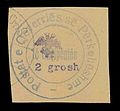Independent Albania
Independent Albania (Albanian: Shqipëria e Pavarur) was a parliamentary state declared in Vlorë (at the time part of Ottoman Empire) on 28 November 1912 during the First Balkan War. Its assembly was constituted on the same day while its government and senate were established on 5 December 1912.
AlbaniaShqipëria (Albanian)
The delegation of Albania submitted a memorandum to the London Conference of 1913 requesting international recognition of independent Albania. At the beginning of the conference it was decided that the region of Albania would be under Ottoman suzerainty but with an autonomous government. The requests by the delegation for recognition based on the ethnic rights of Albanians were rejected and the treaty signed on 30 May 1913 partitioned a major part of the claimed lands between Serbia, Greece and Montenegro, leaving as independent territory only a central region, which was put under the protection of the Great Powers. The ambassadors of six Great Powers met again on 29 July 1913 and decided to constitute a new state, the Principality of Albania, as a constitutional monarchy. Finally, with the Treaty of Bucharest being signed in August 1913, this new independent state was established, leaving about 40%[1] of the ethnic Albanian population outside its borders.
Name[edit]
The name of the state used in the text of declaration of independence of Albania is Shqipëria (English: Albania).[2] It is also referred to as the "independent Albania" (Albanian: Shqipëria e Mosvarme),[3] the "Albanian State"[4] (Albanian: Shteti Shqiptar) or the "independent state of Albania"[5][6] (Albanian: Shteti i pavarur shqiptar).[7]
Territory[edit]
The authority of the state was limited to the regions of Vlore, Berat and Lushnje.[14] The claimed territory was much larger than the territory of contemporary Albania and than the territory over which the Provisional Government exercised its power. It comprised the territories of Kosovo Vilayet, Monastir Vilayet, Shkoder Vilayet and Janina Vilayet.[15] The Treaty of London, signed on 30 May 1913, reduced the territory of Albanian state to its central regions after partitioning a significant part of territory claimed by Albania between the Balkan allies (a major part of the northern and western area was given to the Serbia and Montenegro while the southern region of Chameria became part of Greece).[16] Kosovo was given to Serbia at the London treaty at the insistence of Russia.[17]
During the First Balkan War the kingdoms of Greece, Serbia, Bulgaria and Montenegro aspired to incorporate the entire region into their states (completely denying the Albania's independence), so most of the captured territory was occupied by their armies. Independent Albania did however exercise control over one pocket of land which included Vlore, Berat, Fier and Lushnje.[18]
Economy[edit]
The economy of Albania after it became independent state in 1912 was based on primitive agriculture and livestock, with no significant industry, and little international trade.[94] Starting in 1912, Albania began activities aimed at implementing an agrarian reform, which would transfer ownership of the arable land from the big landowners to the peasants.[95]
Commemorations[edit]
Since Albania was declared independent on November 28, 1912,[119] every 28 November is commemorated by all Albanians (wherever they live in the world) as their Independence Day.[120] In the Republic of Albania, the day is celebrated as a public holiday. In the Republic of Kosovo, the day has been an official public holiday since a 2011 decision of Prime Minister Hashim Thaçi's cabinet.[121]
The proceedings of the conference dedicated to the 70th anniversary of Albania's independence organized in November 1982 by the Academy of Sciences of Albania were entitled "National forces against imperialist dictate in the organization of the Albanian State, 1912-1914: Report".[122] In 1992 the Academy of Sciences of Albania organized a conference dedicated to 80th anniversary of independent Albania and published a document titled: "The organization of government, judicial system and military of Albania (1912-1914)".[123] Year 2012 is a year of the centennial of the Independence of Albania.[124] The opening day of the year-long celebration was on 17 January 2012 during a solemn ceremony held at the Parliament of Albania and attended by Albanian representatives from the Republic of Kosovo, Macedonia, Montenegro, Preševo and Bujanovac, who were joined that day like they were 100 years ago.[125]
The Ministry of Tourism, Cultural Affairs, Youth and Sports announced on 22 December 2011 the "International Competition for the accomplishment in sculpture of the monumental work dedicated to the “100 anniversary of the Declaration of Independence of the Albanian State: 28 November 1912 – 28 November 2012”".[126]




